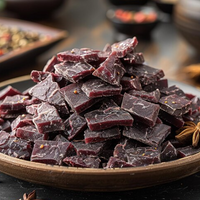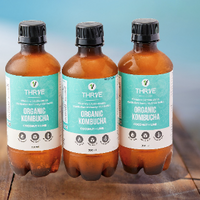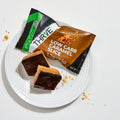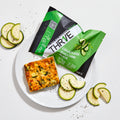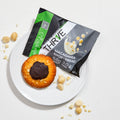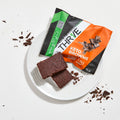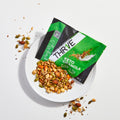Keto is the trend that isn’t going away – and for good reason. Switching to a lower carb diet isn’t just a fad, it can have longer term benefits.
But for those who aren’t clued up on the diet, here’s a run-down on how it works. “The main principle of the keto diet is a reduction in your consumption of carbohydrates, usually to 50 grams or less, and an increase in fats,” says nutritionist Shannon Young. “The aim is to force your body into using a different type of fuel. Instead of relying on sugar (glucose) that comes from carbohydrates, such as grains, legumes, vegetables and fruits, the keto diet relies on ketone bodies, a type of fuel that the liver produces from stored fat.” The keto diet effectively changes your body’s main fuel source.
As so many people use the keto diet for weight loss, you might wonder how it actually burns fat in the body. “The aim of the keto diet is to activate a process called ketosis, this is when your body doesn't have enough glucose to burn for energy, so it burns stored fat and makes things called ketones, which are then used for fuel,” explains Shannon. “By activating ketosis through diet, your body will begin to burn stored body fat resulting in weight loss.”
So, in very simple terms, usually your body gets its energy from sugars, which come from carbohydrates. That’s not just the kind of sugar from chocolate, it’s the sugar that’s in carbs like potatoes, bread, apples – the works. When you remove these foods, the body is forced to find another fuel source, so it basically uses your body fat instead. That’s why it’s important to eat good fats when you’re cutting back on carbs because your body needs the fat for fuel.
The benefits
It may be hard to see the upside of a diet that excludes bread and potatoes. We get it. However, there are actually some pretty incredible benefits that can come from cutting back on carbs. The main reason people adopt the diet is because it’s a powerful weight loss tool. However, it can have other longer-term benefits, too.
“Once ‘fat-adapted’ a lot of people notice an increase in energy levels, concentration and cognitive function,” says Shannon. “The keto diet may also play a role in treatment or prevention of diseases including metabolic syndrome and type 2 diabetes, dementia and Alzheimer’s disease and Polycystic Ovary Syndrome (PCOS).”
Another thing going for the keto diet is its simplicity. There aren’t complex rules – you simply cut back on carbs, make sure you’re getting enough good quality protein and plenty of healthy fats for energy.
What can I actually eat?
The good news is there are plenty of great foods you can eat on the keto diet. This includes moderate amounts of protein such as chicken, beef, fish and eggs. Plus, plenty of good fats like avocado, olive oil, nuts and seeds.
It’s a complete myth that a keto diet is all bacon, all the time. A healthy keto diet should incorporate plenty of non-starchy vegetables, like spinach, broccoli, eggplant, Brussels sprouts and the like. That’s how you get those good-for-you nutrients.
Is the diet right for everyone?
You can never really take a one size fits all approach to diets. “Whilst the keto diet boasts a lot of great benefits, it may not be right for everyone,” says Shannon. “If not followed correctly, the keto diet can cause nutrient deficiencies as you will be cutting out major food groups. It is important to consult a professional before making any significant changes to your diet. Keto may not be safe for people with any conditions involving their pancreas, liver, thyroid or gallbladder.”
Do you have to go ‘full’ keto?
While highly effective, keto can be a pretty drastic diet change. It requires real commitment – to remain in ketosis, you need to consistently keep your carb intake down. However, you can also get perks from a more measured approach.
“You can benefit from following a lower carb diet without needing to go strict keto,” says Shannon. “Increasing healthy fats and protein and reducing simple carbohydrates and sugars is going to give you a much steadier release of energy and keep you fuller for longer. In turn, a higher protein/fat diet reduces hunger, helping you eat fewer calories. This is caused by the improved function of weight-regulating hormones.”
At THR1VE, we have a range of ultra low carb meals that can be integrated into a keto diet. If following a strict keto diet, you might want to add extra healthy fats to your meals – like a scoop of avo or drizzle of olive oil – for extra energy. Otherwise, you can simply enjoy them as part of a healthy diet or as a way to lower your carb intake. Ultimately, you want to find an approach that boosts your wellbeing and works for you in the long term.

